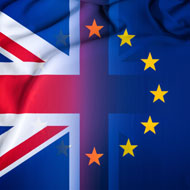Gove highlights challenges of no-deal Brexit

"Nobody can be blithe or blasé about the real impact on food producers of leaving without a deal."
British farmers will experience “considerable turbulence” if the UK leaves the European Union without a deal, according to environment secretary Michael Gove.
Speaking at the Oxford Farming Conference 2019, Mr Gove outlined the potential impact a no-deal Brexit could have on the farming industry.
He said the UK is on the verge of a ‘fourth agricultural revolution’ which will require farmers to change the way they work and invest in their future.
“The more sophisticated than ever analysis of big data, drone development, machine learning and robotics will dramatically improve productivity on traditionally farmed land, not least by reducing the need for labour,” he said.
But Mr Gove also said it was important to be clear about the significant challenges a no-deal Brexit would pose.
“It’s a grim and inescapable fact that in the event of a no-deal Brexit, the effective tariffs in beef and sheep meat would be above 40 per cent - in some cases well above that,” he said.
He also stressed that all products of animal origin will have to go through border inspection posts. There could also be major delays at ports because the major trade route between Dover and Calais doesn’t yet have the necessary inspection posts.
“The combination of significant tariffs when none exist now, friction and checks at the border when none exist now and requirements to re-route or pay more for transport when current arrangements are frictionless, will all add to costs for producers,” he said.
Referring to these costs, Mr Gove explained that Defra was ‘doing everything to mitigate these costs’ and developing plans to help support the industry on a variety of contingencies.
But he added that “nobody can be blithe or blasé about the real impact on food producers of leaving without a deal.”



 The Veterinary Medicines Directorate (VMD) is inviting applications from veterinary students to attend a one-week extramural studies (EMS) placement in July 2026.
The Veterinary Medicines Directorate (VMD) is inviting applications from veterinary students to attend a one-week extramural studies (EMS) placement in July 2026.